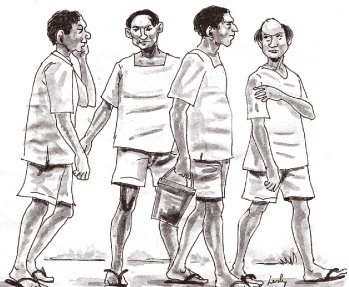The welfare of prisoners

Over the last few weeks, a number of consultations have been held
about measures to improve the Human Rights situation in the country.
These started on an initiative of the Consortium of Humanitarian
Agencies, working together with my office as Adviser on Reconciliation.
Springing from an excellent seminar series which CHA began on
Reconciliation, the first of which was addressed by MPs Muralitharan,
Wickramaratna and Sumanthiran, in addition to myself, moderated
productively by javid Yusuf, the series of Consultations began with
sessions on Prisoners, Women and Children.
We began with these because we felt that these were areas in which
there was broad agreement on what needed to be done, and no ideological
opposition.
The only reasons for failure to move forward on policies on which
there was consensus were, on the one hand the lethargy that is endemic
in any governmental system worldwide, and on the other the difficulties
of achieving concerted action when responsibility is so confusingly
divided up between several Ministries.
I had had an inkling of such problems when the Minister of Justice
mentioned a very helpful paper he had received from the ICRC about
improving the situation of Prisoners, but noted that, while half the
paper dealt with issues pertaining to his Ministry, the other half
related to the Ministry of Prison Reforms and Rehabiliation. This had
indeed been noted by His Excellency the President in the budget speech,
which made some excellent suggestions about prisons, from the idealistic
perspective of serving the interests of those languishing in jails, as
well as the very practical perspective of reducing the unnecessary
expenditure we now incur.
In Para 19 he suggested a way of reducing the numbers of those in
prison because they cannot pay fines. In Para 20 he talked about using
the example of the highly successful rehabilitation of former LTTE
combatants to reduce the number of prisons and instead establishing
rehabilitation centres.
 He went further and spoke of turning the minds of prisoners to sports
and vocational and skills development. Sadly, as with many of the
brilliant ideas in the budget, we see no progress as yet towards these
ideals. He went further and spoke of turning the minds of prisoners to sports
and vocational and skills development. Sadly, as with many of the
brilliant ideas in the budget, we see no progress as yet towards these
ideals.
I suspect we will see none until we actually develop a more practical
way of ensuring implementation through line Ministries of policies laid
down by the Chief Executive, which will necessitate at least a few
Ministers chosen from outside Parliament, as happens in other political
dispensations that have a separately elected Chief Executive. Meanwhile
I will note some of the issues that were discussed, with notes as to how
we could proceed:
Prisons are currently overcrowded by 400 percent with 100,000
unconvicted prisoners - magistrates should be advised to refuse to
remand unless it is essential, and police should be advised to charge
for offences that are bailable when possible.
Reports required from institutions such as the Government Analystís
Department can take years, while the Attorney Generalís Department also
takes much time to decide on cases - such institutions must be advised
to adhere to strict timelines, with mandatory explanations to the Human
Rights Commission or an equivalent body in case of delays
Lack of implementation of present policy recommendations - The
Presidentís budget speech has emphasized changes in the present method
of remanding improving conditions for those sentenced.
The Human Rights Action plan has good initiatives but is to be
implemented. When efforts of introducing counseling sessions were
implemented, the prison guards opposed this idea and, instead, increased
the number of guards in various prisons. The guards did not want the
presence of counselors to affect their control over the prisoners and
influence the prison mentality of fear.
The prisons currently have a few thousand uniformed staff and fewer
than 100 out of uniform - The cadre for Welfare Officers was reduced and
instead more guards were appointed.
This system must be changed, and graduates should be trained in
Counselling and appointed as Welfare/Education officers. Instead of
dumping unemployed graduates in Ministries where they have nothing to
do, they should be appointed as Counsellors (and in other areas apart
from prisons) with specific responsibilities and reporting schedules.
No accurate record of the arrival and departure dates of those
remanded and in prison - All prisons should be required to maintain
records of those committed to their care, on a schedule that records the
date of release or review. Magistrates should be made aware of this
requirement, and should avoid committing without a specific date. They
should also avoid postponing cases when this contributes to further
incarceration without due reason.
No system in place to promote rehabilitation and reintegration of
prisoners and remandees - Released prisoners could be assisted through
loan opportunities with the collaboration of banks.
A support system for rehabilitation which introduces vocational
training and counseling for prisoners as well as a mid-way house once
they have left prison will assist ex-prisoners to reconnect with society
and prevent them from engaging in further criminal activity. Provision
should be put in place for prisoners 3-6 months before they are
released.
Lack of coordination between key stakeholders - Given the different
institutions involved, it might be best for an independent institution
without executive authority to coordinate reform of the system.
The Human Rights Commission could perhaps have regular meetings of
the Ministries involved as well as Police, the Attorney Generalís
Department and the Judicial Service Commission. This would have more
authority than the current coordinating mechanism which is through UNDP.
Though donors and advisers have a significant role to play, reform
must be driven by those responsible for action, with an overarching body
to oversee expectations.
|



